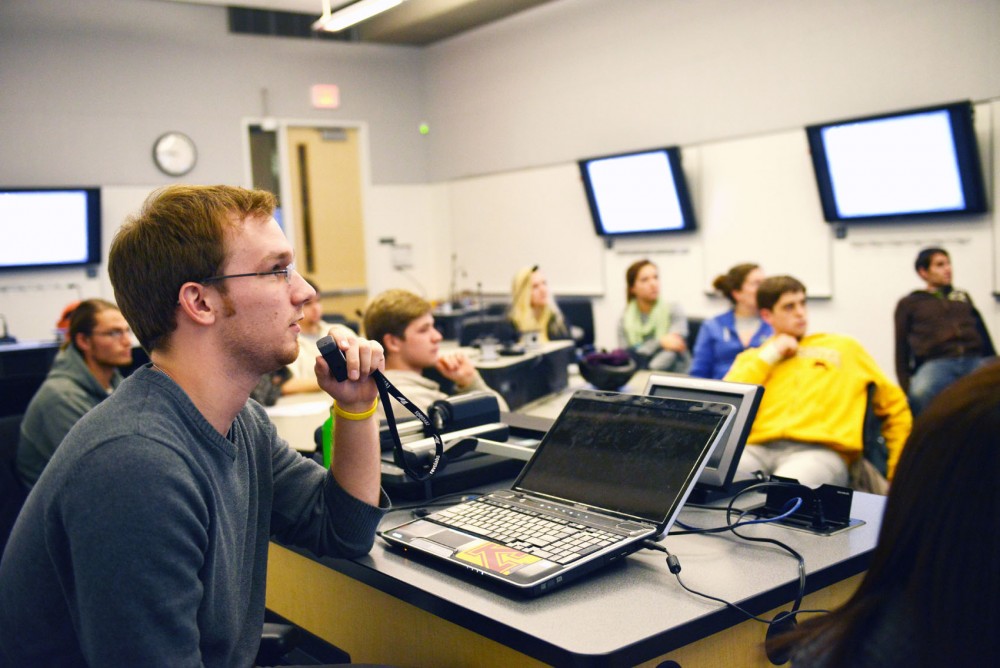Following election losses in Minnesota, many Republicans are exploring what the future of the party will look like.
The Liberty movement could be it.
Whether recruiting university students, funding political candidates or talking with neighbors, members of the movement pioneered by Rep. Ron Paul, R-Texas, believe this is just the beginning.
“I think for the most part, the Republicans are more inclined to be open to having as many people involved as possible,” said Marianne Stebbins, who chaired the state’s delegation to the Republican National Convention. “Now, if they’re smart politically, they’ll understand that Liberty is the future of the Republican Party.”
During Paul’s presidential bid, the movement gained steam nationally and in Minnesota.
At the RNC in September, 33 of 40 Minnesota delegates voted for Paul.
After losing legislative control this election, some believe the Republican Party will be more receptive to the movement that champions freedom and small government.
“Within the Minnesota GOP, obviously we had huge losses as a party, and really that brings a good debate and a healthy debate I think within the party itself as to what our message is going to be in future elections,” said finance and applied economics junior Adam Motzko.
Motzko is president of Young Americans for Liberty, a student group at the University of Minnesota that grew from eight to 45 members over the past year.
Motzko said the group will continue its work discussing issues and growing the movement on campus. It has recently taken up the topics of Internet freedom and legalization of marijuana, getting more than 400 signatures on the Internet freedom petition.
“We’re really just going to keep hitting the ground with full force and be super active on campus and try to expand our movement that way,” Motzko said.
At the statewide level, some are focusing on a strong political presence and others on growing the Liberty network.
Bill Paulsen, one of the Minnesota national delegates to the RNC who voted for Paul, is working to form a Liberty PAC in Minnesota.
“The goal would be to help candidates who want to advance an agenda of a limited government get the message out while campaigning and get elected,” Paulsen said.
It’s still in the planning stages but is slated to come together early next year.
Stebbins said she is focusing less on political action and more on “growing the Liberty network.”
She is forming a group called “Liberty Kids” and has encouraged people to form their own local groups.
“We know that politics follows the hearts and minds of the population,” Stebbins said. “And so we know that when we’re able to convince our neighbors that we live better when we live free, we know that politics will then follow.”
At home in the Republican Party
The Liberty movement has grown largely out of the Republican Party’s history of small government, and many aim to change the party from within.
“In practical terms, if you want to run a political campaign at this point, you’re better off working within one of the two parties,” Paulsen said.
Stebbins said voters deserve a choice between big government and small government, and right now both parties favor the former.
“The public lost faith with the Republican Party when they saw that all they were going to do was also grow government,” Stebbins said.
“The Republican Party should be the party that stands for smaller government. Right now it’s our natural home, and I hope that we will be able to grow the Liberty movement within the Republican Party.”
Motzko said he thinks the party will be more receptive to the Liberty movement following Republican losses.
“If we were forced out of the party, I think the Republican Party would continue to become more irrelevant as each election passes, and pretty soon it’s going to wither away,” Motzko said, “and by that time the Liberty movement will be grown so large it will take over whatever the Republican Party once had.”
Losing a figurehead?
With Ron Paul’s retirement from political office, the movement is losing its main figurehead from the political arena. Paul will continue to spread the movement’s message with the nationwide Campaign for Liberty.
“Losing a figurehead like Ron Paul in the political spectrum is going to be tough to keep the fight going,” Motzko said, “but I think the Liberty movement itself is motivated enough, activated enough to keep the fight going.”
Motzko said Paul will likely visit the University in the spring semester.
Members of the movement, however, believe that it has evolved beyond a personal following and into a clear message independent of a single leader.
“It’s not necessarily about Ron Paul himself, I think it’s more about the principles than a single person,” Paulsen said.
“[The Liberty movement] stands for freedom, basically the idea that when people live free, they live better and that people do the best when they’re in control of their own destiny,” Paulsen said.
The movement had little political success this election in Minnesota but made some progress nationally.
“We probably have about 14 spawns of Ron Paul, I like to call them, in Congress right now, whereas we didn’t before the election,” Motzko said. “We definitely have had success this election.”
Paulsen said he thinks the Republican Party will gradually shift toward the ideals of the Liberty movement, particularly with the strong support the movement draws from younger people.
“In the long term, it’ll move closer towards where they are, but it’s not going to be overnight.”








